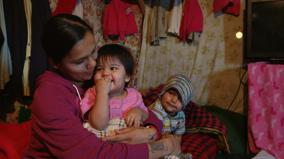New release
Coming
None
Limit Is the Sky
2016
1 h 47 min
Leaving soon
This documentary follows six young Canadians, including refugees from the Middle East and Africa, who come to Fort McMurray, the capital of the third-largest oil reserve in the world. “Fort Mac,” as it’s known, becomes a testing ground for these young dreamers as they struggle with their own perceptions of money, glory and self-worth amid plummeting oil prices, an unpredictable economy and, most recently, awe-inspiring wildfires.

Details
This documentary follows six young Canadians, including refugees from the Middle East and Africa, who come to Fort McMurray, the capital of the third-largest oil reserve in the world. “Fort Mac,” as it’s known, becomes a testing ground for these young dreamers as they struggle with their own perceptions of money, glory and self-worth amid plummeting oil prices, an unpredictable economy and, most recently, awe-inspiring wildfires.
-
writerJulia Ivanova
-
directorJulia Ivanova
-
producerBonnie Thompson
-
executive producerDavid Christensen
-
cinematographyJulia Ivanova
-
drone cameraTim Moen
-
location managerTim MoenKelton Stepanowich
-
editorJulia Ivanova
-
assistant editorClark HendersonOliver LessardGreg Masuda
-
VFXMike Jackson
-
motion graphicsMike Jackson
-
coloristSerge Verreault
-
online editorSerge Verreault
-
sound recordingJulia Ivanova
-
sound editorChris McIntosh
-
re-recording mixerJean Paul Vialard
-
graphic artistMélanie Bouchard
-
creditsJacques Bertrand Simard
-
transcriptionSharon MurphyPatricia Garry
-
researchElizabeth KlinckKelly Fox
-
rights clearancesElizabeth KlinckKelly Fox
-
production coordinatorJasmine PullukattFaye Yoneda
-
production supervisorMark Power
-
post-production technical coordinatorSteve Hallé
-
marketing managerLeslie Stafford
-
program administratorBree BeachGinette D'Silva
-
centre operations managerDarin Clausen
Education
Pedagogical evaluations and study guides are only available to CAMPUS subscribers.
CAMPUS
Features designed specifically for teachers. Learn more
Already subscribed? Sign in











